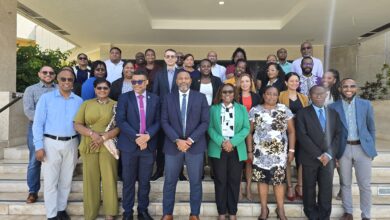CHRIST CHURCH, BARBADOS – The WTO General Council last week approved a Framework which sets out the parameters for continued DDA negotiations. WTO Members negotiated intensively for two weeks prior to culminating in a marathon session which began at 5pm on Friday July 30, and ended almost 24 hours later on Saturday afternoon. The Framework single undertaking, referred to as the “Oshima Text” after the Chairman of the General Council Ambassador Shotaro Oshima, effectively reduces the previously considered scope of negotiations, but also reflects the determination of countries to succeed in Geneva, particularly with the memory of failure at Cancun in 2003 still fresh in the minds of many participants. Hence, several developed and developing countries have hailed the Framework as a success, notwithstanding the reduction in scope. Back at the Caribbean Regional Negotiating Machinery (CRNM) Headquarters in Kingston, Jamaica this afternoon, Director General Richard Bernal stressed that this Framework is the basis for continuing negotiations and that the details of the technical negotiations are yet to be negotiated. He added that it is the operationally viable expressions of Special and Differential Treatment (SDT), which are most critical for smaller vulnerable economies like Caribbean Community (CARICOM) States, and that CARICOM will have to continue to maintain a strong presence in these negotiations. The Director General further noted that CARICOM will intensify efforts to strengthen collaboration with traditional strategic alliances and actively explore non-traditional relationships, adding that “for small developing economies, success in an imperative not an option.” He cautioned that although this outcome is considered to be a success in the context that negotiations are back on-track, CARICOM States will need to be particularly vigilant in the ensuing negotiations in order to ensure that their needs are taken into account and adequately reflected in a practical and manageable way in the final agreement(s). Key Elements of the Oshima Text Agriculture: The Framework calls for all trade-distorting domestic support to be reduced according to a tiered formula and for the development of modalities that will ensure the “parallel elimination of all forms of export subsidies by a credible end date.” While there are no explicit exemptions for developing economies, Members may designate an “appropriate number, to be negotiated, of tariff lines to be treated as sensitive, taking account of existing commitments for these products.” In addition, a Special Safeguard Mechanism (SSM) will be established for use by developing countries. Non-Agricultural Market Access (NAMA): NAMA negotiations will aim to reduce or eliminate tariffs and non-tariff barriers to trade on the basis of a non-linear formula applied on a line-by-line basis. Although no allowance was made for exemptions for developing countries, such countries will have a longer implementation period for tariff reductions. In developing a formula approach, attention must be given not only to reducing tariffs but also reducing and/or eliminating tariff peaks and tariff escalation. Future negotiations shall take fully into account the special needs and interests of developing and least developed countries, including “through less than full reciprocity in reduction commitments.” Services: Negotiations must aim for progressively higher levels of liberalization, again with no a priori exclusion of any service sector or mode of supply. Although the decision calls for a high quality of offers “particularly in sectors and modes of supply of export interest to developing countries,” this phrase is enveloped in ‘best endeavour’ language and can therefore be considered as non-obligatory. In addition, Members who have not yet submitted initial offers must do so as soon as possible, and revised offers must be tabled by May 2005. Trade Facilitation: Members have agreed to commence negotiations on Trade Facilitation with a view to expediting the movement, release and clearance of goods, including goods in transit. The Framework requires that these negotiations take fully into account the principle of SDT, and recognizes that SDT extends beyond transition periods for implementing commitments. It further recognizes that “the extent and the timing of entering into commitments shall be related to the implementation capacities of developing and least-developed countries.” The remaining Singapore Issues: Transparency in Government Procurement, Investment and Competition Policy are excluded from the DDA. The CARICOM region was represented by a team led by Guyana’s Trade Minister, Clement Rohee, and consisting of senior technical experts from the CRNM as well as Ambassadors and officials from CARICOM missions in Geneva and Brussels.
News Letter
Subscribe to our mailing list to get the new updates!
Check Also
Close





